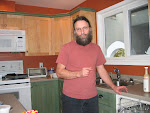 ite a sports blog. You can see it at http://mcsportsblog.blogspot.com/ -- in fact, he'd be delighted if you would leave some comments.
ite a sports blog. You can see it at http://mcsportsblog.blogspot.com/ -- in fact, he'd be delighted if you would leave some comments.When Lucas brought this project home, Beth and I decided that we would also establish year-long goals so we would all being doing something together. Beth decided to take piano lessons. That worked well until the (electronic) piano stopped working properly (hey, Duncan, want to buy a used piano?). She's into photography now.
My goal was to run a marathon. I've been a runner for a number years; my first participation in an organized run must have been 20 years ago or so -- the Run, Wall and Roll in Calgary, as I recall, and I ran in a number of others during those early years, especially in Banff --Melissa's, Winter Start etc. When I moved to Victoria I kept it up but starting in about 2005 I seem to have stopped. I had many excuses (pressures of work, you know, that sort of thing) but they all disappeared with my new goal.
Today I ran my second half-marathon. I thought I might run in the Royal Victoria Marathon next month but after running the Land's End half today, I realize that I'm not ready for it. I'm pretty sure I wouldn't finish. (Beth and Lucas seem willing to accept that two halves equal a whole.) It was a great run today but it was blisteringly hot especially towards the end and, as in my first (ever) half (the Oak Bay one), I started to fade badly at the 18k mark. My time today was about the same as my previous attempt: 2:02, 2:03. I may be getting older but at least I'm not getting any slower! True, there are lots of runners my age who do it much faster though, so age is not really an excuse. Okay, so at least I finished.
I'm too exhausted right now to contemplate signing up for another run. Probably in a week's time I'll gain some motivating perspective. We'll see. But I do like setting goals.


